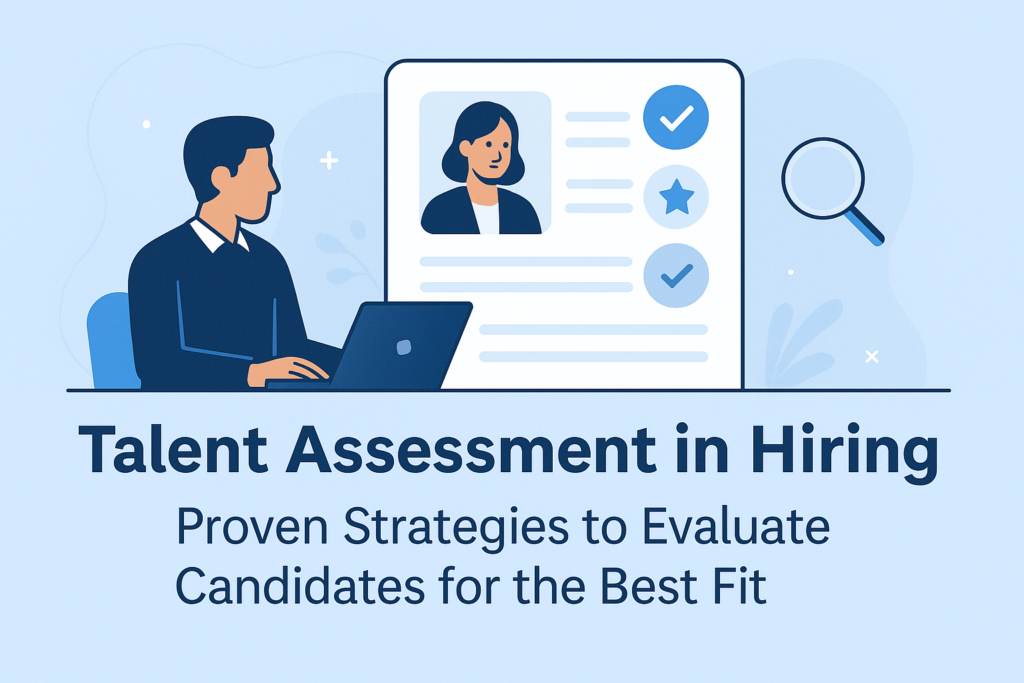Talent Assessment in Hiring: Proven Strategies to Evaluate Candidates for the Best Fit

Introduction
In a competitive hiring landscape, finding the right talent isn’t just about reviewing résumés — it’s about evaluating potential, performance, and cultural fit. That’s where talent assessment in hiring becomes crucial.
Whether you’re scaling a startup or optimizing enterprise recruitment, using structured and strategic candidate evaluation methods leads to better hiring decisions, lower turnover, and stronger teams.
In this blog, we’ll explore how to assess candidates effectively, the tools you can use, and how to align assessments with your company’s hiring goals.
1. Why Talent Assessment Matters in Recruitment
Many hiring failures aren’t caused by a lack of skill, but by poor alignment between the candidate and the role or company culture. Implementing structured talent assessment practices helps recruiters:
- Identify the best candidate-job fit
- Reduce bias and improve fairness
- Predict future performance more accurately
- Save time and reduce costly mis-hires
According to research by the Aberdeen Group, companies using pre-hire assessments report 36% more satisfaction with their new hires.
2. Define What You’re Evaluating
Before assessing talent, clarify what “fit” means for your company and the role. Break it down into measurable categories:
- Technical skills – Role-specific hard skills, certifications, or qualifications
- Soft skills – Communication, problem-solving, collaboration
- Cultural fit – Alignment with team values, mission, and pace
- Growth potential – Willingness to learn, adaptability, ambition
When each category is clearly defined, interviews and tests become more focused and productive.
3. Use Structured Interviews
One of the most effective ways to evaluate candidates is through structured interviews, where each candidate is asked the same set of standardized questions.
This method allows hiring teams to:
- Compare candidates fairly
- Reduce unconscious bias
- Focus on job-relevant competencies
Use scoring rubrics and feedback forms to maintain consistency across interviewers.
✅ Tip: Combine behavioral interview questions (e.g., “Tell me about a time…”) with situational ones (e.g., “How would you handle…?”) for better insight.
4. Pre-Employment Assessments
Modern recruitment tools offer a wide range of pre-employment assessment platforms designed to test cognitive ability, technical skills, personality, and more.
Popular tools:
- Codility, HackerRank – for assessing developers
- TestGorilla, Toggl Hire – for soft skills, culture fit, and general aptitude
- Pymetrics, Plum – for personality and behavioral insights
Use these tools to screen candidates objectively before moving them to the final interview stages.
5. Assign Role-Relevant Tasks
To see how candidates perform in real-world scenarios, assign job simulations or practical tasks. These could include:
- Writing a short code snippet or email
- Pitching an idea based on a product brief
- Prioritizing tasks for a hypothetical day
These exercises reveal more than just knowledge — they show how a candidate thinks, communicates, and handles pressure.
6. Evaluate Cultural Fit Without Bias
Culture fit (learn more about cultural fit vs skills) matters — but it shouldn’t become a code word for hiring people who are “just like us.” Instead of vague impressions, assess values alignment with questions like:
- “What kind of work environment helps you thrive?”
- “How do you handle feedback?”
- “What motivates you beyond salary?”
This makes cultural evaluation more inclusive and actionable.
7. Combine Assessment Results for Better Decision-Making
A smart hiring process brings together:
- Interview scores
- Task performance
- Assessment results
- Reference feedback
Create a candidate scorecard where each component contributes to an overall rating. This helps teams avoid gut-based decisions and stay aligned.
8. Keep the Candidate Experience Positive
While assessments are valuable, avoid making the process feel like an obstacle course. Ensure:
- Timely communication
- Transparent expectations
- Constructive feedback,
- where possible
A good assessment process should reflect your employer brand and leave candidates feeling respected, even if they’re not selected.
Conclusion
Effective talent assessment in hiring is a game-changer. By combining structured interviews, pre-employment tests, practical tasks, and thoughtful cultural evaluation, you build a hiring process that delivers both speed and quality.
Companies that invest in smart candidate evaluation strategies don’t just hire faster — they hire smarter. And in today’s global talent market, that’s the competitive edge you need.
